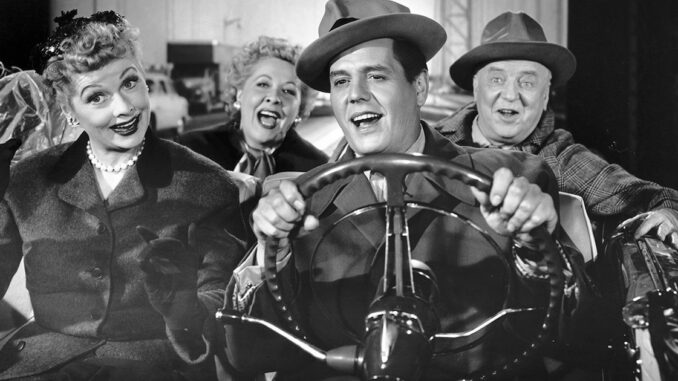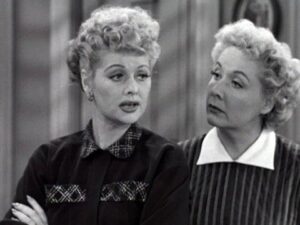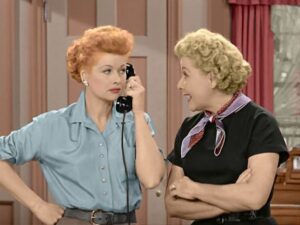
Introduction: Why Lucy and Ethel’s Friendship Needs a 2024 Lens
Lucy Ricardo and Ethel Mertz from I Love Lucy were the ultimate besties, offering countless laughs and chaotic antics. But if you take a closer look, their friendship reveals dynamics that wouldn’t sit well in today’s world. From sneaky schemes to outdated stereotypes, let’s explore what about their relationship wouldn’t fly today.
Lucy and Ethel’s Frenemy Moments
The Constant Bickering: A Friendship Built on Insults?
Who hasn’t chuckled at Lucy and Ethel’s playful jabs? But modern audiences might see their relentless teasing as borderline toxic. Instead of uplifting each other, their friendship often leaned on sarcastic put-downs.
The Petty Competitiveness
Remember when Lucy and Ethel tried to outdo each other at everything? Whether it was sewing their club outfits or baking that infamous bread, their rivalry could be seen as fostering unhealthy competition rather than mutual support.

The Problem with Ethel Always Cleaning Up Lucy’s Mess
Ethel as the Enabler
Ethel was always dragged into Lucy’s wild schemes, no matter how absurd. Whether it was stomping grapes or impersonating celebrities, Ethel was the ultimate accomplice. In today’s world, we’d call that enabling, not friendship.
Where’s Ethel’s Agency?
Modern audiences value balanced friendships where both people have equal say. Ethel often felt like a sidekick rather than an equal partner, with her own dreams and desires often taking a backseat to Lucy’s.
Outdated Gender Roles in Their Friendship
The ‘Perfect Housewife’ Expectations
Lucy and Ethel often upheld 1950s ideals of women managing the home while their husbands worked. From managing household chores to budgeting mishaps, their friendship revolved around reinforcing these now-dated stereotypes.
Their Husbands’ Control Over Their Lives
Fred and Ricky frequently dismissed Lucy and Ethel’s ideas or forbade them from participating in certain activities. Today, such dynamics would spark conversations about autonomy and respect in relationships.
Scheming Behind Their Husbands’ Backs
Dishonesty as a Friendship Pillar
So many of Lucy and Ethel’s escapades involved lying to their husbands. Whether it was sneaking into a nightclub or hiding a shopping spree, deception was a recurring theme. In 2024, this would be seen as a red flag in any friendship dynamic.
Lack of Open Communication
Instead of honest conversations, Lucy and Ethel relied on elaborate plots to get their way. This lack of transparency might not sit well with modern audiences who value open communication.

Financial Mishaps and Irresponsibility
Joint Schemes That Lead to Financial Trouble
From buying expensive items to failing at business ventures, Lucy and Ethel often found themselves in financial messes. Today, their behavior might be labeled as financially irresponsible rather than comedic.
Reinforcing Stereotypes About Women and Money
Their antics sometimes reinforced the stereotype that women were poor financial planners, which could be seen as problematic through a contemporary lens.
Body Image and Appearance Jokes
Poking Fun at Ethel’s Weight
Some episodes included jokes about Ethel’s weight, often played for laughs. Today, such humor would likely face backlash for body shaming.
Ageist Remarks
Both Lucy and Ethel, especially Ethel, were often subject to jokes about aging. In a time when inclusivity and body positivity are celebrated, these comments would be considered inappropriate.
Privacy? What Privacy?
Overstepping Boundaries
Lucy and Ethel constantly invaded each other’s privacy. Whether it was reading each other’s mail or eavesdropping, these behaviors could be labeled as intrusive today.
Blurring Lines Between Friendship and Invasion
Friendship thrives on respect, and Lucy and Ethel’s tendency to meddle might not align with current ideals of personal boundaries.
The Lack of Emotional Vulnerability
Always Laughing, Never Crying
Lucy and Ethel shared a lot of laughs, but rarely did they show emotional vulnerability. Today, friendships that encourage openness and emotional support are highly valued.
The Absence of Serious Conversations
Their friendship revolved around humor and antics, with little room for deep, meaningful discussions about their lives or feelings.
The Enduring Appeal Despite These Flaws
Despite these problematic elements, Lucy and Ethel’s friendship remains iconic. Their loyalty, shared laughter, and undeniable chemistry are qualities that continue to resonate with audiences. Their bond teaches us that while friendships may evolve, the core of supporting and sticking by each other remains timeless.
Conclusion
Lucy and Ethel’s friendship from I Love Lucy may have aspects that feel outdated today, but it’s a reflection of its time. By revisiting these dynamics through a modern lens, we can appreciate the show’s humor while acknowledging its cultural limitations. Their friendship still holds valuable lessons about loyalty, even if some of their antics would raise eyebrows today.
FAQs
1. Were Lucy and Ethel friends in real life?
Yes, Lucille Ball and Vivian Vance were good friends off-screen, though they had their share of ups and downs.
2. Why did I Love Lucy become so iconic?
The show’s blend of humor, relatable characters, and groundbreaking production techniques made it a classic.
3. How did audiences react to Lucy and Ethel’s friendship in the 1950s?
Audiences loved their comedic chemistry, seeing it as a reflection of the close-knit friendships of that era.
4. Would Lucy and Ethel’s antics work in modern sitcoms?
While some elements might feel outdated, their loyalty and humorous escapades could still resonate with audiences today.
5. What lessons can we learn from Lucy and Ethel’s friendship?
Their bond highlights the importance of loyalty, humor, and standing by each other through life’s ups and downs.